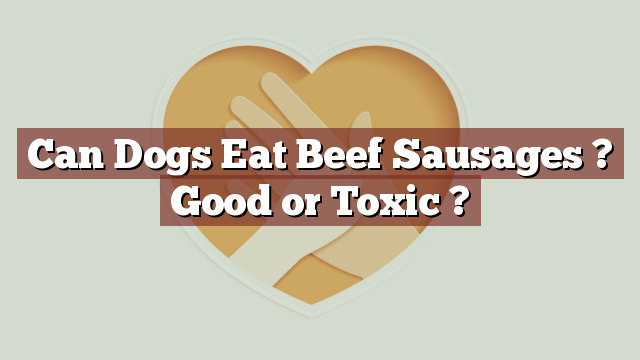Can Dogs Eat Beef Sausages? Good or Toxic?
Feeding our furry companions the right food is essential for their overall health and well-being. As responsible pet owners, it’s crucial to be aware of what foods are safe and appropriate for our dogs to consume. One common question that often arises is, "Can dogs eat beef sausages?" Let’s delve into this topic and uncover the safety and potential risks associated with feeding beef sausages to dogs.
Nutritional Value of Beef Sausages for Dogs: What You Need to Know
Beef sausages are typically made from ground beef, mixed with various seasonings and spices. They are a popular choice for human consumption due to their savory taste. When it comes to dogs, however, it is important to consider their specific nutritional needs. Beef sausages can provide essential nutrients such as protein, iron, and B-vitamins. However, it’s worth noting that they can also be high in fat, sodium, and preservatives, which may not be suitable for all dogs.
Can Dogs Eat Beef Sausages? Unveiling the Safety and Toxicity
Yes, dogs can eat beef sausages, but it is crucial to exercise caution and moderation. While beef sausages are not toxic to dogs, certain factors need to be taken into account. The high fat and sodium content in sausages can be problematic for dogs, especially those with underlying health conditions such as pancreatitis, obesity, or heart disease. Additionally, the seasonings and spices used in sausages, such as garlic or onion powder, can be harmful to dogs in large quantities.
Potential Risks and Benefits: Exploring the Impact on Dogs’ Health
Feeding beef sausages to dogs can pose potential risks to their health. The high fat content can lead to weight gain and obesity, which can increase the risk of various health issues, including diabetes and joint problems. The excessive sodium content in sausages can cause dehydration and negatively impact the cardiovascular system. Moreover, the presence of spices like garlic or onion powder can potentially damage a dog’s red blood cells.
On the flip side, if fed in moderation and as an occasional treat, beef sausages can provide some benefits to dogs. The protein found in beef sausages can help support muscle growth and development. However, it is important to ensure that the sausages are cooked thoroughly, without any added spices or seasonings that may be harmful to dogs.
My Dog Ate Beef Sausages, What Should I Do? Immediate Steps and Precautions
If your dog has consumed beef sausages, it is crucial to take immediate action, especially if the sausages contained harmful ingredients. Contacting your veterinarian is highly recommended to seek professional advice tailored to your dog’s specific needs. They will be able to guide you on the necessary steps to take, which may include inducing vomiting or monitoring your dog for any potential adverse reactions.
Conclusion: Balancing Risks and Rewards of Feeding Beef Sausages to Dogs
In conclusion, while dogs can eat beef sausages, it is essential to consider the potential risks and benefits. Moderation, caution, and a thorough understanding of your dog’s specific dietary needs are key factors to keep in mind. Opting for leaner cuts of meat and avoiding sausages with harmful additives or seasonings is advisable. Remember that a well-balanced and nutritionally complete diet, consisting of dog-friendly foods, is crucial for the overall health and happiness of your beloved furry friend.
Thank you for investing your time in exploring [page_title] on Can-Eat.org. Our goal is to provide readers like you with thorough and reliable information about various dietary topics. Each article, including [page_title], stems from diligent research and a passion for understanding the nuances of our food choices. We believe that knowledge is a vital step towards making informed and healthy decisions. However, while "[page_title]" sheds light on its specific topic, it's crucial to remember that everyone's body reacts differently to foods and dietary changes. What might be beneficial for one person could have different effects on another. Before you consider integrating suggestions or insights from "[page_title]" into your diet, it's always wise to consult with a nutritionist or healthcare professional. Their specialized knowledge ensures that you're making choices best suited to your individual health needs. As you navigate [page_title], be mindful of potential allergies, intolerances, or unique dietary requirements you may have. No singular article can capture the vast diversity of human health, and individualized guidance is invaluable. The content provided in [page_title] serves as a general guide. It is not, by any means, a substitute for personalized medical or nutritional advice. Your health should always be the top priority, and professional guidance is the best path forward. In your journey towards a balanced and nutritious lifestyle, we hope that [page_title] serves as a helpful stepping stone. Remember, informed decisions lead to healthier outcomes. Thank you for trusting Can-Eat.org. Continue exploring, learning, and prioritizing your health. Cheers to a well-informed and healthier future!

